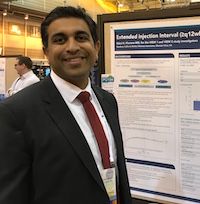Aflibercept Shows 12-plus Week Interval Potential in AMD Patients
A study sub-analysis showed the anti-VEGF treatment maintained efficacy over longer intervals in a majority of patients.

Rahul Khurana, MD
In a sub-analysis review of one of the largest clinical trials for patients with wet age-related macular degeneration (AMD), a researcher found that over half of patients on their second year of anti-vascular endothelial growth factor (VEGF) therapy aflibercept were able to extend treatment intervals to every 12 weeks.
The analysis of the VEGF Trap-Eye: Investigation of Efficacy and Safety in Wet AMD (VIEW 1, VIEW 2) studies, Rahul N. Khurana, MD, found that the approximate 54% of aflibercept patients to extend treatment intervals to every 12 weeks reported maintained vision and anatomic improvements.
The studies, which showed aflibercept 8-week treatment interval in the first year of therapy was as effective as 4-week ranibizumab, gave Khurana an opportunity to see how patients would respond to the expanded treatment interval rates available in the second year of treatment.
“In the second year, patients have the option to go up to 3 months without needing a treatment if they were stable from both a visual acuity perspective and an optical coherence tomography (OCT) perspective,” Khurana told MD Magazine at the 121st Annual Meeting of the American Academy of Ophthalmology (AAO 2017) in New Orleans, LA.
The VIEW 1 and VIEW 2 studies randomized 2,457 AMD patients evenly to 4 different therapy groups: 2mg aflibercept every 4 weeks; 0.5mg aflibercept every 4 weeks; 2mg aflibercept every 8 weeks; 0.5mg ranibizumab every 4 weeks. All treatment regimens were preceded by 3 initial monthly doses.
In patients to receive 2mg initial aflibercept injection (IAI), about 43% to 50% of VIEW 1 patients and 53% to 58% of VIEW 2 patients were able to receive 12-week treatments intervals during the second, based on anatomic re-treatment criteria.
The factors most associated with patients dosing at 12-plus week intervals at week 52 were absence of retinal fluid and leakge.
Khurana called it a “kind of surprising and reassuring amount” of patients to report durability in aflibercept 12-week treatment.
Aflibercept, marketed as Eylea by Regeneron Pharmaceuticals, was first approved by the US Food and Drug Administration (FDA) for wet AMD in 2011. Ranibizumab is marketed for wet AMD in the US under the trade name Lucentis, by Genentech.
Researchers also gauged the studies’ results for baseline predictors of patients who would need more frequent doses. Khurana found that patients with occult lesions at baseline were generally held to more frequent doses. Additionally, patients with leakage presence on OCT or fluorescein angiography at week 52 needed more frequent treatment doses going into their second year of therapy.
The analysis was limited by a maximum treatment interval of 12 weeks in the second year, meaning that aflibercept patients with the right re-treatment criteria could wait even longer between treatment doses, Khurana said.
“There are some treatment extend studies that have come out in Japan — they’re showing there’s a good amount of patients that could go even longer,” Khurana said. “The main thing we’re trying to figure out is what’s the right dosage.”
Khurana said he thinks of wet AMD as a “chronic, variable, unpredictable disease,” with varying dosing regimens. But he found assurance in the discovery that extended intervals are feasible for the right patients.
“We need to know more on what that right interval is,” Khurana said. “I would caution that each patient is different, and there’s no one size that fits all in a treatment strategy.”